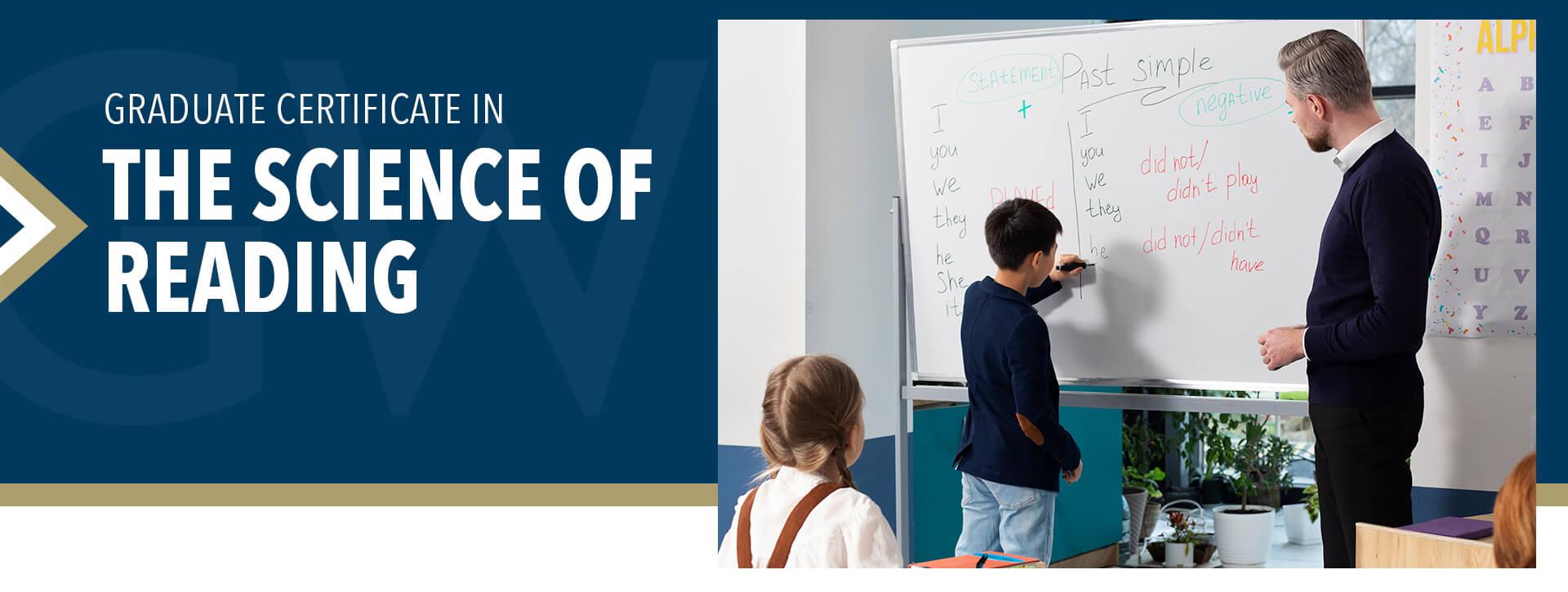Graduate Certificate in the Science of Reading
Transform Reading Instruction. Empower Every Learner.
GW's Graduate Certificate in the Science of Reading equips educators with the skills and pedagogical expertise to deliver effective, evidence-based reading instruction rooted in the science of how students learn to read. Aligned with the gold-standard International Dyslexia Association (IDA) guidelines and the latest research, this 12-credit program is designed to meet the urgent demand for educators who are prepared to teach reading using scientifically-based reading instruction practices—supporting struggling readers, students with reading disabilities, and general education learners.
Program graduates gain not only deep expertise in structured literacy and reading development, but also the tools to analyze data, tailor instruction, and drive meaningful progress for diverse student populations. Receive training in the foundations of language and literacy develop as well as evidence-based reading instruction.
Developed for educational professionals to begin implementing on-the-job in real time, the certificate offers intensive coursework and live-time faculty engagement within a collaborative cohort model.
Designed for education professionals to gain pedagogical knowledge and skills to support science-based reading instruction, with specialized expertise for developing readers and those identified with reading disabilities.
A Stepping Stone to a Master's Degree
Students can complete the program as a stand-alone certificate or apply the credit hours toward the Master's in Special Education Non-Licensure Track.
*If accepted and all requirements met
Accessible + Flexible
Complete the program fully online, wherever you are in the world. Synchronous sessions are scheduled once weekly in evenings to accommodate working professionals.
Scholar-Practitioner Faculty
Receive 1:1 mentorship and live, interactive course delivery from leading faculty that bring diverse professional experiences in the field.
Degree Awarded:
Graduate Certificate in the Science of Reading
Department:
Special Education and Disability Studies
Course Delivery:
Online
Program Entry:
Spring, Fall
- Our Mission
GSEHD's Department of Special Education & Disability Studies programs are dedicated to preparing knowledgeable, effective, and ethical special education professionals to serve diverse students with disabilities and their families. Our programs are grounded in the philosophical position that teaching is an act of transformative social justice, operationalized and actualized through the practice of personalized teaching and learning.
- Curriculum
The following requirements must be fulfilled: 12 credits in required courses.
Code Title Required SPED 6200 Foundations of Reading Instruction SPED 6202 Researching Current Trends in Special Education: Collaboration and Teacher Decision Making SPED 6203 Research and Practice of Diagnostic Reading for Students with Disabilities SPED 6266 Development of Language and Literacy - Program Outcomes
The Graduate Certificate in the Science of Reading prepares educators to develop deep knowledge in the science of reading and scientifically based reading instruction.
- Graduate students will be able to demonstrate knowledge of the science of reading and the tenets of scientifically-based reading instruction and apply new knowledge to analyze existing, locally-based reading curricula.
- Graduate students will be able to identify, design, deliver, and assess effective scientifically-based reading instruction, consistent with the latest evidence on the relationships between language and literacy and processes and sequences of reading acquisition for typical learners, as well as those at-risk for and/or identified with disabilities.
- Graduate students will be able to demonstrate the ability to reflect on the effectiveness of scientifically-based reading instruction utilizing concrete progress monitoring tools and formative assessments and utilize those reflections to make evidence–supported adjustments to instructional approaches and curricula to meet the reading development needs of every learner.
The GW Advantage
Whether on-campus or online, a GW education offers a distinctive, high-impact experience. Our online courses mirror the rigor and engagement of the classroom, while offering the flexibility of distance learning. You'll learn from nationally recognized scholar-practitioner faculty who bring real-world insight and diverse perspectives. With personalized mentorship and a high-touch learning environment, you’ll gain the skills to advance your career—and transform the educational experiences of your students.
Career Outlook
A Graduate Certificate in the Science of Reading equips educators and specialists with research-based knowledge of how students learn to read and how to support literacy development—particularly in early and elementary education. While it doesn’t typically lead to licensure on its own, this credential enhances professional qualifications and opens doors to a variety of education-related roles. It's especially valuable for those looking to lead reading initiatives, support struggling readers, or help schools implement structured literacy practices grounded in science.
- Common Career Paths
Please note: Teaching licensure or additional certification may be required for the following career paths.
In Schools and Districts
- Literacy Coach / Reading Specialist: Support classroom teachers in implementing evidence-based reading instruction, assess student progress, and lead literacy interventions.
- Elementary or Early Childhood Educator: Enhance your instructional impact in reading and literacy, especially in districts prioritizing structured literacy aligned with the science of reading.
- Special Education Teacher: Strengthen your ability to support students with reading challenges such as dyslexia, using explicit, systematic approaches.
- Instructional Coach / Curriculum Coordinator: Lead the integration of research-based reading practices school- or district-wide.
- RTI/MTSS Interventionist: Deliver tiered reading interventions based on student data, often in K–3 settings.
- ESL/ELL Teacher: Design and deliver structured literacy instruction to English language learners, using science-backed strategies to build foundational reading skills alongside language acquisition.
Curriculum and Assessment
- Curriculum Developer – Literacy Focus: Create and align literacy curricula with evidence-based reading practices, ensuring materials support diverse learners across grade levels.
- Assessment Specialist in Reading/Language Arts: Develop and analyze literacy assessments to identify student needs, track progress, and support data-informed instruction rooted in the science of reading.
- Educational Consultant (Literacy Interventions): Work with schools, districts, or organizations to evaluate, train, or support literacy instruction initiatives.
Beyond the Classroom
- Education Nonprofit Program Manager (Literacy-Focused): Lead literacy initiatives within community-based or national organizations, using research-based frameworks to promote reading equity and program effectiveness.
- State or District Literacy Coordinator: Oversee literacy programs and professional development at the district or state level, guiding the implementation of structured literacy aligned with current legislation and best practices.
- Private Literacy Tutor or Academic/Dyslexia Interventionist: Use structured literacy and science-backed methods in private practice or learning centers.
- Advocate or Policy Advisor in Literacy Education: Influence education policy and literacy reform by promoting science-based reading instruction and equitable access to high-quality literacy education.
- Literacy Advocate / Nonprofit Program Specialist: Support literacy initiatives in community-based organizations, nonprofits, or advocacy groups focused on reading equity and access.
For International Educators
- Language/Literacy Program Leader: Direct school-wide or district-wide literacy initiatives, ensuring instruction aligns with the science of reading and meets the needs of multilingual and diverse learners.
- Teacher Trainer – Science of Reading Focus: Train and mentor educators in evidence-based reading instruction, providing coaching and professional development to improve classroom literacy outcomes.
- International School Literacy Coordinator: Lead literacy instruction across international school settings, bridging cultural contexts with structured literacy strategies to improve global reading achievement.
Apply Now
Applications are not currently being accepted for this program. For more information or to inquire about the next admissions cycle, contact the GSEHD Admissions Team at teachinfo![]() gwu [dot] edu (teachinfo[at]gwu[dot]edu) or 202-994-9283.
gwu [dot] edu (teachinfo[at]gwu[dot]edu) or 202-994-9283.
To be considered for admission, applicants must submit the online application form as well as the following required supporting documents. There is no application fee.
- Prerequisite: Bachelor's Degree
- Resume
- Transcripts from all previously attended colleges or universities
- Statement of Purpose
- One Letter of Recommendation
*Additional application requirements may exist for international applicants.
Applications are not currently being accepted for this program. For more information or to inquire about the next admissions cycle, contact the GSEHD Admissions Team at teachinfo![]() gwu [dot] edu (teachinfo[at]gwu[dot]edu) or 202-994-9283.
gwu [dot] edu (teachinfo[at]gwu[dot]edu) or 202-994-9283.
Tuition & Financial Aid
We know embarking upon graduate school is a big decision - due in part to the costs of attending. At GW, we understand the time and thought behind making graduate school work for you. Please take a moment to learn more about the options and opportunities available to help fund your graduate education.
Graduate tuition is charged per credit hour, unless otherwise noted. Rates vary by program and location.
The tuition rate* for the Graduate Certificate in the Science of Reading program is $1,000 per credit hour.
This program requires 12 credits.
Please note: Additional fees may apply for international students, late fees, etc. Current tuition rates may be updated during the year.
*Fall 2025 and Spring 2026



Assistant Professor, Special Education and Disability Studies


Department Chair and Associate Professor, Special Education and Disability Studies


